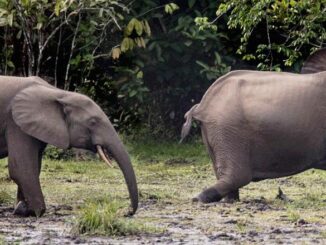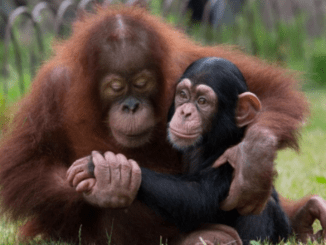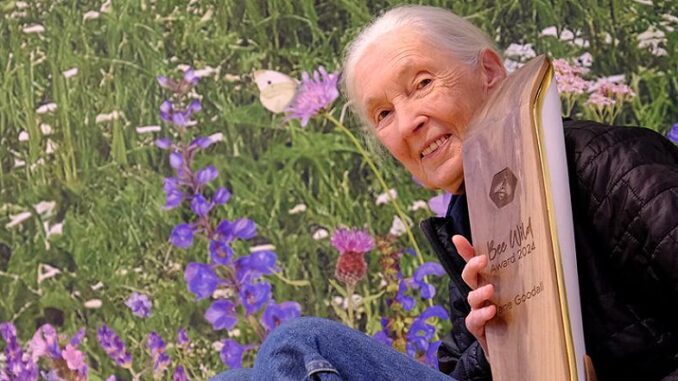
LOS ANGELES, California, October 1, 2025 (ENS) – Dr. Jane Goodall, famed chimpanzee scientist, founder of the Jane Goodall Institute and UN Messenger of Peace, died of natural causes Wednesday at the age of 91. Dr. Goodall died peacefully in her sleep while in Los Angeles for her speaking tour in the United States. She was considered the world’s foremost expert on chimpanzees, having studied the social and family interactions of wild chimpanzees for over 60 years.
Born Valerie Jane Morris-Goodall in London, England, she was best known to the world as Dr. Jane Goodall, primatologist and anthropologist.
“Dr. Goodall’s life and work not only made an indelible mark on our understanding of chimpanzees and other species, but also of humankind and the environments we all share. She inspired curiosity, hope and compassion in countless people around the world, and paved the way for many others – particularly young people who gave her hope for the future,” the Jane Goodall Institute said in a statement Wednesday.
“She was a remarkable example of courage and conviction, working tirelessly throughout her life to raise awareness about threats to wildlife, promote conservation, and inspire a more harmonious, sustainable relationship between people, animals and the natural world,” the Institute said.
In 1960, Dr. Goodall established the world’s longest running wild chimpanzee study in Gombe National Park, Tanzania which continues today.
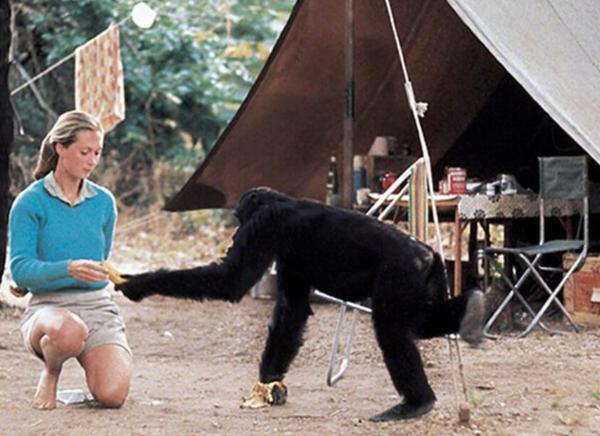
She pioneered and sustained the Jane Goodall Institute’s community-centered conservation initiatives across the chimpanzee range for decades. Her legacy includes the creation of Jane Goodall Institute’s international environmental and humanitarian youth program Roots & Shoots which is actively driving change in nearly 75 countries around the world.
The groundbreaking scientific discoveries and methods established by Dr. Goodall are helped to remove barriers for women in science and other fields.
Her breakthrough and most famed observation of tool-use in non-human animals is known as the moment that “redefined humankind,” according to the Jane Goodall Institute. This finding was followed by many others during her research into the lives of wild chimpanzees.
Her findings included the existence of strong mother-infant bonds, meat-eating and hunting, primitive warfare, altruism, and compassion.
Dr. Goodall’s findings, and her passion and ingenuity, also influenced fields of human health, evolution, and ecology.
The Life of Jane Goodall
Born Valerie Jane Morris-Goodall on April 3, 1934, in London England, she became a world-renowned scientist and environmental advocate, traveling, writing and speaking on the impact of climate change on endangered species such as chimpanzees.
In 1957, at the age of 23, Goodall’s love of animals led her to take a position as a secretary to famed Kenyan paleoanthropologist Louis Leakey.
By 1960, Leakey, eager to learn more about primates to deepen his study of early humans, had sent Goodall, then 26, to Gombe, in northwestern Tanzania, to study chimpanzees in the wild.
Goodall immersed herself in their habitat as a neighbor rather than a distant observer. Her discovery in 1960 that chimpanzees make and use tools shocked the scientific world and redefined the relationship between humans and animals.
In 1961, Goodall was one of the few students accepted into a PhD program at Cambridge University in England without an undergraduate degree. She completed her doctorate in 1965.
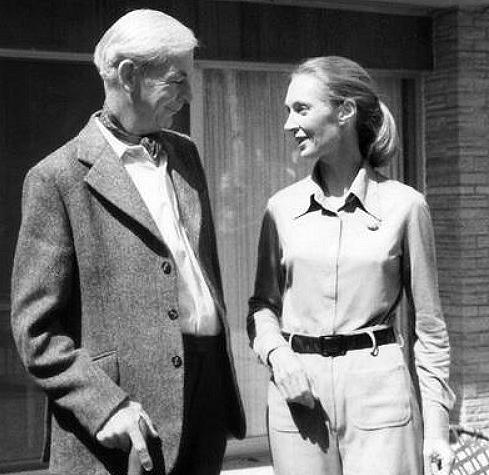
In 1963, “National Geographic” magazine published the first cover story about Dr. Goodall and her research. The article, “My Life Among the Wild Chimpanzees,” brought Dr. Goodall and her chimps into the homes of millions.
Goodall was married twice. On March 28, 1964, she married a Dutch nobleman, wildlife photographer Baron Hugo van Lawick, at Chelsea Old Church, London, and became known during their marriage as Baroness Jane van Lawick-Goodall.The couple had a son; they divorced in 1974.
The following year, Dr. Goodall married Derek Bryceson, a member of Tanzania’s parliament and the director of Tanzania’s national parks. Bryceson died of cancer in October 1980.
In 1965, National Geographic filmed and released “Miss Goodall and the Wild Chimpanzees” bringing the lives of chimps and her research into the spotlight internationally.
In 1977, she established the Jane Goodall Institute to advance her work around the world and for generations to come. The Institute continues the field research at Gombe and builds on Dr. Goodall’s innovative approach to conservation, which recognizes the central role that people play in the wellbeing of animals and the environment.
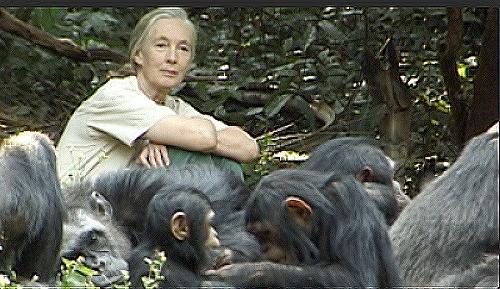
In 1991, she created Roots & Shoots, a global program that guides young people in 75 countries in becoming compassionate citizens and leaders in their daily lives.
in 1992, the Jane Goodall Institute established the 27-square-mile Tchimpounga Chimpanzee Rehabilitation Center in the Republic of the Congo for chimpanzees orphaned by the illegal commercial bushmeat and pet trades. The sanctuary was funded by Conoco, the global energy giant. It now cares for more than 150 chimpanzees.
She served as president of Advocates for Animals, an organization based in Edinburgh, Scotland, that campaigns against the use of animals in medical research, zoos, farming and sport.
She was a vegetarian, and later a vegan, and advocated the diet for ethical, environmental, and health reasons. In her book “The Inner World of Farm Animals,” (2009) Goodall wrote that farm animals are “far more aware and intelligent than we ever imagined and, despite having been bred as domestic slaves, they are individual beings in their own right. As such, they deserve our respect. And our help. Who will plead for them if we are silent?”
Goodall also said, sadly, “Thousands of people who say they ‘love’ animals sit down once or twice a day to enjoy the flesh of creatures who have been treated with so little respect and kindness just to make more meat.”
Goodall spoke on the effects of climate change on endangered species such as chimpanzees.
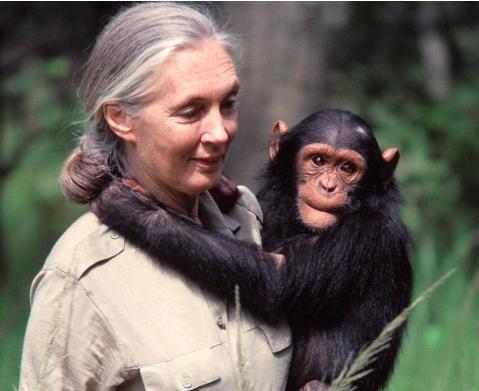
“Chimpanzees are highly social animals, very intelligent and have complex emotions like humans – it is imperative that we portray them appropriately and that they receive the best possible care in captive environments,” she said.
“To ensure the safe and ethical treatment of animals during ethological studies, Goodall, co-founded the organization Ethologists for the Ethical Treatment of Animals in 2000.
In 2018, World Chimpanzee Day was established to raise awareness for the care, protection, and conservation of chimpanzees both in the wild and in captivity.
In 2021, Dr. Goodall published the “Book of Hope” in which she shares her reasons for hope – human intellect, the resilience of nature, the power of young people, and the indomitable human spirit. Also in 2021, Goodall became a vegan and authored a cookbook titled “Eat Meat Less.”
Dr. Goodall traveled throughout the world, speaking about the threats facing wildlife, environmental crises and her reasons for hope. In her books and speeches, she emphasized the interconnectedness of all living things and the collective power of individual action.
Dr. Goodall was a UN Messenger of Peace and a Dame Commander of the British Empire.
Having served as a UN Messenger of Peace since 2002, Dr. Goodall’s recent efforts were marked by her tireless commitment to sharing her message of hope and inspiring individuals around the world to take action and make a difference every day.
Dr. Goodall has published scholarly articles and books, many of which have been translated into dozens of languages to help spread her message of hope throughout the world.
Most recently, she received the United States’ Presidential Medal of Freedom from President Joe Biden in January 2025, for her contributions to science and tireless advocacy for the planet.
She used her platform to support human rights, animal welfare, species and environmental protection, and many other issues. Her podcast, “The Hopecast” reached millions, and she travelled nearly 300 days a year inspiring audience worldwide with her reasons for hope.
Dr. Goodall’s vision-turned-mission lives on in the Jane Goodall Institute, which has chapters in 25 countries around the world. The global organization will continue to uphold and expand Dr. Goodall’s holistic approach to involve local communities in conservation efforts using the latest science and technology to promote understanding, conservation, and welfare of wild and captive apes.
The Roots & Shoots program, one of her most beloved initiatives, will continue to empower young people to live as compassionate citizens, and become our much-needed future conservation leaders.
The Jane Goodall Institute says it is “incredibly grateful to all our supporters, partners, and friends, especially during this difficult time.”
To add a personal remembrance of Dr. Goodall and continue her legacy, please visit: www.janegoodall.org/rememberingjane
To see a more complete account of Jane Goodall’s life and work, visit: https://en.wikipedia.org/wiki/Jane_Goodall
Featured image: Dr. Jane Goodall, founder of the Jane Goodall Institute, UN Messenger of Peace, and Dame Commander of the Order of the British Empire, is a world-renowned ethologist and activist who inspired greater understanding and action on behalf of nature. October 25, 2024, University of Salzburg, Austria. (Photo by
© 2025, Environment News Service. All rights reserved. Content may be quoted only with proper attribution and a direct link to the original article. Full reproduction is prohibited.

